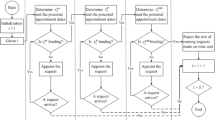Abstract
Health-care consumers continue to be frustrated with long waits, especially when an appointment has been made. However, providers who book appointments are under increasing pressure to maximize utilization so that revenues will be increased and costs reduced. Thus, scheduling appointments involves opposing forces that are difficult to manage. This challenge is addressed in a rolling-horizon environment with fluctuating demand loads. These two issues have not been explored previously in the appointment-scheduling research. Two management policies are considered: overload rules (OLR) and rule delay (RD). The former considers different scheduling methods (overtime, double booking) when demand loads are high, and the rule delay policy considers when to implement the overload rules. These methods are explored for six different demand patterns/loads and evaluated with a variety of client and server-oriented measures. The results show that managers of appointment scheduling systems must carefully consider which measures are most important to them since the best choices of OLR and RD vary substantially by measure. Good choices also depend on the general type of client demand pattern. Thus, to consider the various tradeoffs between client and server measures a matrix is developed that outlines good choices for each scenario.
Similar content being viewed by others
References
P. Gopalakrishna and V. Mummalaneni, Influencing satisfaction for dental services, Journal of Health Care Marketing 13 (1993) 16-22.
N.T. Bailey, A study of queues and appointment systems in hospital qutpatient departments, Journal of the Royal Statistical Society A 14 (1952) 185-199.
K.J. Klassen and T.R. Rohleder, Scheduling outpatient appointments in a dynamic environment, Journal of Operations Management 14 (1996) 83-101.
T.R. Rohleder and K.J. Klassen, Using client-variance information to improve dynamic appointment scheduling performance, Omega 28 (2000) 293-302.
M. Brahimi and D.J. Worthington, Queueing models for out-patient appointment systems — A case study, Journal of the Operations Research Society 5 (1991) 91-102.
A. Hamidi-Noori, Scheduling a high contact service organization: A simulation study, Simulation and Games 15 (1984) 315-327.
C. Ho and H. Lau, Minimizing total cost in scheduling outpatient appointments, Management Science 38 (1992) 1750-1764.
C.-J. Ho and H.-S. Lau, Evaluating the impact of operating conditions on the performance of appointment scheduling rules in service systems, European Journal of Operational Research 112 (1999) 542-553.
Family Medicine Clinic, Interviews with J. Hagel: Receptionist (Calgary, AB, Canada, 1994).
Westwood Family Physicians, Interviews with L. Tucker and K. Thomas: Receptionists (Calgary, AB, Canada, 1994).
A.M. Law and W.D. Kelton, Simulation Modeling & Analysis (McGraw-Hill, Inc., New York, 1991).
M. Brahimi and D.J. Worthington, The finite capacity multi-server queue with inhomogenous arrival rate and discrete service time distribution and its application to continuous service time problems, European Journal of Operational Research 50 (1991) 310-324.
R. East, W. Lomax, G. Willson and P. Harris, Decision making and habit in shopping times, European Journal of Marketing 28 (1994) 56-71.
B.E. Kahn and D.C. Schmittlein, Shopping trip behaviour: An empirical investigation, Marketing Letters 1 (1989) 55-69.
V.A. Mabert and M.J. Showalter, Measuring the impact of part-time workers in service organizations, Journal of Operations Management 9 (1990) 209-229.
G.S. Fishman, Principles of Discrete Event Simulation (Wiley, New York, 1978).
F. Faul and E. Erdfelder, GPOWER: A prior, post hoc and compromise power analysis for MS-DOS (Department of Psychology, University of Bonn, Bonn, Germany, 1992).
SAS Institute, SAS/STAT User's Guide (1988).
Author information
Authors and Affiliations
Rights and permissions
About this article
Cite this article
Rohleder, T.R., Klassen, K.J. Rolling Horizon Appointment Scheduling: A Simulation Study. Health Care Management Science 5, 201–209 (2002). https://doi.org/10.1023/A:1019748703353
Issue Date:
DOI: https://doi.org/10.1023/A:1019748703353




